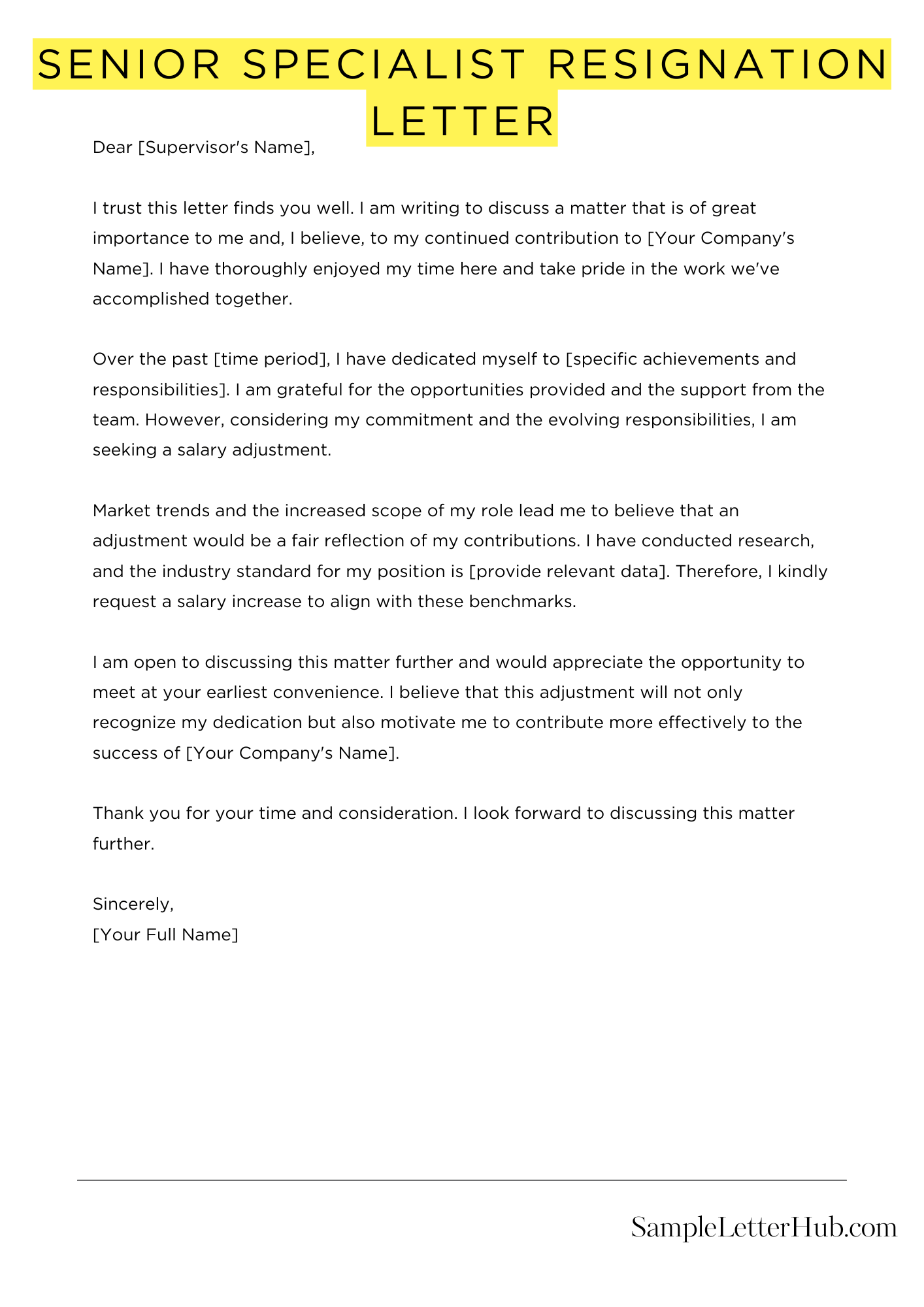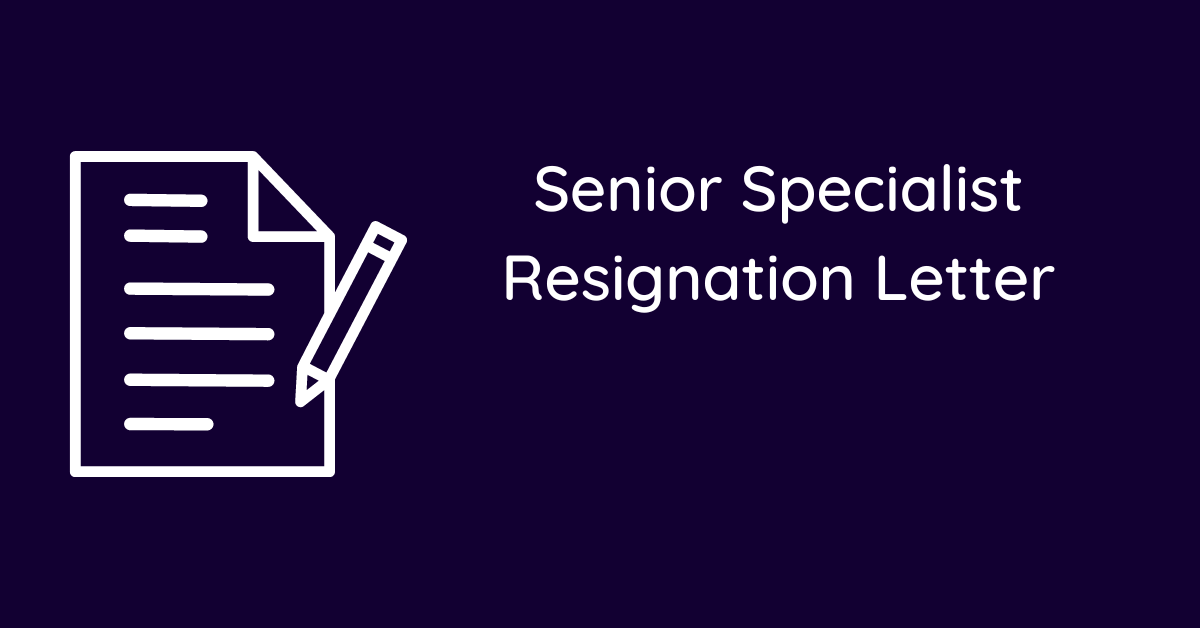When it comes to leaving a job, one way to do it is to write a clear and professional resignation letter explaining your decision to leave. It’s important to be polite and humble in the letter’s tone, even if you’re not happy with the company or your job.
Below, we’ve shared a template/example senior specialist resignation letter that you can use. It’s important to tailor the letter to your specific situation, but this template can serve as a good starting point.
Remember, leaving a job is never easy, but it’s important to do it in a way that’s respectful of your employer and colleagues. By following these tips, you can make the transition as smooth as possible.
Senior Specialist Resignation Letter
Dear [Recipient Name],
Please accept this letter as formal notification that I will be resigning from my position as Senior Specialist at [Company/Organization Name], effective [Last Date of Employment].
During my tenure, I have valued the opportunities and experiences I have gained. I am grateful for the support and guidance I have received from my colleagues and superiors.
I wish you and the company all the best in the future.
Sincerely,
[Your Signature]
Short Senior Specialist Resignation Letter Sample
Please accept this letter as formal notification that I am resigning from my position as Senior Specialist at [Company Name]. My last day of employment will be [Your Last Day]. Thank you for the opportunity to grow and learn during my time here. I wish you and the company continued success. I am happy to assist in the transition process to ensure a smooth handover of my responsibilities.
I wish you all the best with your senior specialist resignation letter.
When it’s time to say farewell, expressing your gratitude and best wishes can make the transition smoother:

How to Write a Senior Specialist Resignation Letter
1. Start with a Formal Salutation
Begin your letter with a formal salutation, such as “Dear [Manager’s Name].” If you don’t know your manager’s name, you can use “To Whom It May Concern.”
2. State Your Intention to Resign
In the first paragraph, clearly state your intention to resign from your position as a Senior Specialist. Include your last date of employment. For example, you could write:
“I am writing to inform you of my decision to resign from my position as Senior Specialist at [Company Name], effective [Your Last Date of Employment].”
3. Express Your Gratitude
Take a moment to express your gratitude for the opportunity to work at the company. Mention specific experiences or projects that you enjoyed or that helped you grow professionally. For example, you could write:
“I have thoroughly enjoyed my time at [Company Name] and am grateful for the opportunities I have been given. I have learned a great deal and have grown both professionally and personally.”
4. Offer to Help with the Transition
If you are able, offer to help with the transition during your notice period. This could include training your replacement or documenting your work processes. For example, you could write:
“I am happy to assist in any way possible to ensure a smooth transition during my notice period.”
5. Close with a Professional Farewell
End your letter with a professional farewell. You can wish your manager and the company well in the future. For example, you could write:
“I wish you and [Company Name] all the best in the future. Thank you again for the opportunity to work here.
6 Most Frequently Asked Questions on Senior Specialist Resignation Letters
Resigning from a senior specialist position can be a daunting task, but it’s essential to do it professionally and respectfully. Here are the six most frequently asked questions about senior specialist resignation letters, along with their answers:
1. What should I include in my resignation letter?
Your resignation letter should include your name, position, the date you’re resigning, and your last day of employment. You should also express your gratitude for the opportunity to work at the company and briefly state your reasons for leaving.
2. How should I format my resignation letter?
Your resignation letter should be formal and concise. Use a standard business letter format and keep it to one page. Use a professional font and font size, and make sure your letter is free of errors.
3. When should I submit my resignation letter?
It’s generally advisable to give your employer at least two weeks’ notice. This will give them time to find a replacement and ensure a smooth transition. However, if you have a particularly close relationship with your employer or if there are extenuating circumstances, you may be able to give less notice.
4. What should I do if I’m not sure how to write my resignation letter?
If you’re not sure how to write your resignation letter, you can find templates online or consult with a career counselor. You can also ask a friend or family member to review your letter before you submit it.
5. What should I do if my employer asks me to stay?
If your employer asks you to stay, it’s important to be polite but firm. Thank them for their offer and explain that you’ve made up your mind to leave. You can also offer to help with the transition in any way you can.
6. What should I do after I submit my resignation letter?
After you submit your resignation letter, it’s important to maintain a positive attitude and continue to perform your job to the best of your ability. You should also be prepared to answer any questions your employer may have about your departure.
Before making the decision to resign from your job, it’s essential to consider the legal aspects:
Understanding your emotions after quitting your job is important. Explore why you might be feeling sad:
Related
- Resignation letter sample
- Forced resignation letter
- Resignation letter due to going abroad
- Resignation letter due to marriage
- Resignation letter due to other opportunity
- Resignation letter due to mistake

